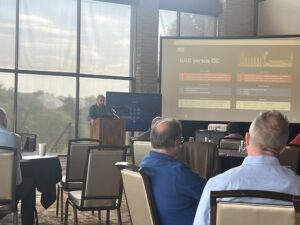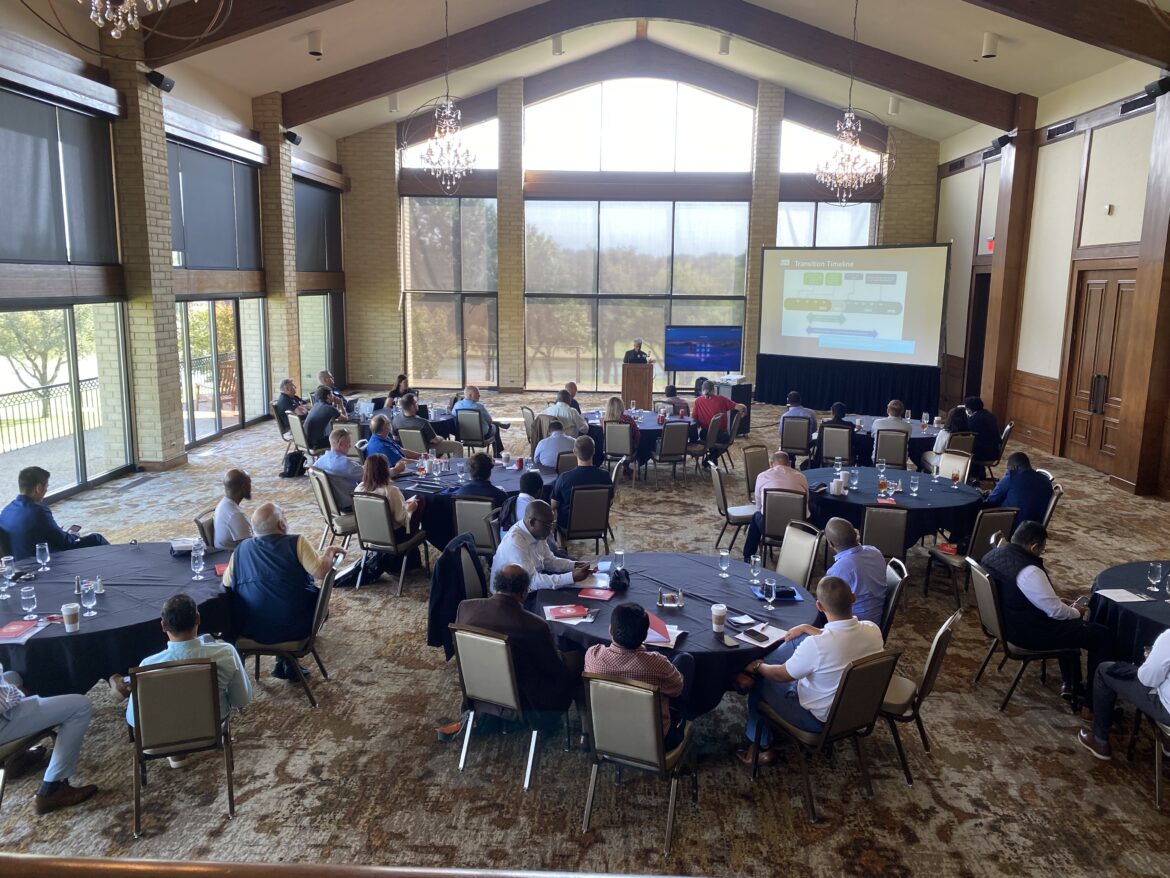The team here at RSI Security enjoyed discussing cybersecurity and compliance at the Dallas Arrange GRC held on October 17 at the Las Colinas Country Club. Along with industry leaders like KnowBe4, FortifyData, and GroundLabs, we shared insights on regulatory compliance best practices for addressing business risks. If you could not attend or are interested in learning more about governance, risk management, and compliance, read on for a recap of the event.
Managing Cybersecurity Risks with Regulatory Compliance
Cybersecurity risk management is critical to meeting business objectives and achieving intended outcomes with minimal operational disruptions. At the Dallas Arrange GRC, the conversations on compliance and risk management focused on three distinct areas:
- Optimizing compliance with the recently released PCI DSS 4.0 framework
- Maximizing the value of risk management with continuous compliance monitoring
- Emerging perspectives on managing cybersecurity risks via regulatory compliance
As Dallas GRC participants held conversations with cybersecurity professionals at the education sessions and live demos, it was clear that building relationships with trusted partners is essential to enhance any organization’s security posture—and successfully manage risk.
Optimizing PCI DSS 4.0 Compliance
Mohan Shamachar, Director of Information Security & Compliance at RSI Security, led the education session on compliance with the recently updated PCI DSS 4.0 framework. With the help of the Payment Card Industry (PCI) Data Security Standards (DSS) Requirements, organizations that process cardholder data (CHD) can keep it safe at all times.
In March 2022, the PCI Security Standards Council (SSC) released DSS v4.0, replacing v3.2.1 and improving the security of card payments amidst rapidly evolving technological threats.
Understanding the update is critical to maintaining your compliance—and security.
Updates to the PCI DSS 4.0 Requirements
The majority of updates to the PCI DSS 4.0 Requirements aim at:
- Improving the clarity of the DSS controls listed in each Requirement
- Ensuring controls recommended in the framework are up-to-date with:
- Emerging threats to CHD
- Newer card payment processing technologies
- Aligning the content of each individual Requirement to improve the overall coherence of the framework
Remaining compliant with the PCI DSS 4.0 will require organizations to fully understand its Requirements during the transition period stipulated by the SSC.
PCI DSS 4.0 Rollout Dates – What to Expect
If you are still reviewing the changes to the DSS Requirements outlined in v4.0, you have until the end of March 2024, after which it will be recognized as the only active PCI DSS version.
During this period of transition from v3.2.1 to v4.0, you can:
- Gain familiarity with the changes to the overall DSS structure and Requirements
- Updates the forms and templates used for compliance reporting
- Start implementing the required changes to your security controls
Organizations also have until March 2025 to implement new requirements identified as best practices in DSS v4.0.
Assessment of PCI DSS 4.0 Compliance
PCI DSS 4.0 compliance assessments typically involve:
- Defining the scope of a PCI DSS assessment
- Assessing the defined PCI environment
- Completing a relevant report on compliance (RoC) per the PCI DSS guidelines
- Filling out the Attestation of Compliance (AoC) for merchants or service providers
- Submitting compliance reports to SSC stakeholders or other requesting organizations
- Remediating vulnerabilities identified in assessments
Compliance assessments are critical to evaluating the effectiveness of your IT infrastructure.

Governance, Risk & Compliance (GRC) vs. Continuous Compliance
Brandon Reed, Director of Technical Services at RSI Security, discussed the benefits of GRC and continuous compliance tools in meeting data security needs. For organizations whose operations require compliance with various regulatory frameworks, it may be challenging to track the controls listed in each framework. That’s where compliance tracking tools help.
In particular, GRC tools and continuous compliance approaches are two effective approaches.
Leveraging GRC Technology
GRC tools help automate compliance processes and minimize gaps and vulnerabilities in critical security controls. When implemented effectively, these tools will drive:
- Documentation of compliance workflows
- Reporting processes across regulatory frameworks
- Speedy compliance assessments
These tools are most effective if you implement them based on an up-to-date security policy.
Tracking Continuous Compliance
Ongoing regulatory compliance is critical to identifying gaps in your security and mitigating threats before they impact your sensitive data. With continuous compliance, you can meet the requirements of regulatory frameworks 24/7. As the IT security landscape evolves, tracking continuous compliance will help you meet the security needs of your industry as they change, enabling you to keep your digital assets safe in a fast-evolving threat landscape.
Diverse Compliance and Risk Management Perspectives
Other speakers at the Dallas GRC included:
- KnowBe4’s James McQuiggan (Security Awareness Advocate), who spoke about the relationship between regulatory compliance and data security.
- FortifyData’s Butch Holly (Channel Partner Manager) and Eric Smith (Director of Technical Services Delivery/Solution Engineer), who spoke about the various tools that can automate compliance and manage risk—especially during security assessments.
- Ground Labs’ Jamie Brown (Director of Channels, North America and LATAM), who talked about sensitive data storage and compliance with the PCI DSS and HIPAA.
The best way to maximize your ROI with compliance optimization is to work with an experienced compliance services specialist who will guide you at each step to certification and beyond.
Partner with RSI Security to Optimize Your Security Posture
Regulatory compliance is critical to meeting the security standards of your industry and safeguarding the sensitive data you handle. Whether you are required to comply with the PCI DSS, HIPAA, HITRUST, GDPR, CCPA, or other regulatory frameworks, partnering with a compliance advisor like RSI Security will help you build reliable data security controls.
Contact RSI Security today to learn more about our compliance advisory services!
